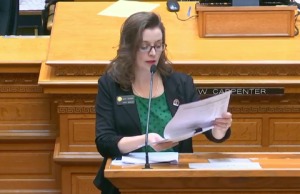Denver — Second reading of a bill that would equalize local mill levy funding for charter schools was postponed for the second time this week after senators spent nearly two hours debating several amendments to the bill.
SB17-061, which would require school districts with current mill levy overrides (MLOs) to share the funding with their charter schools will be continued by the full senate on Monday.
It is expected to pass the Senate mostly along party lines, however, it appears to be gaining support from Democrats, including co-sponsor Angela Williams, (D-Denver).
Colorado charter schools are tuition-free public schools. They are non-profit, cannot test students for admission, and they are held to the same accountability standards as traditional district schools.
However, charter schools do not have the ability to ask voters for bond money for capital expenses. Therefore, most charters use a portion of their per pupil revenue for their buildings.
Mill levy overrides are additional property taxes approved by voters within a specific school district that are above the state limit. Historically, school districts have not shared those funds with their authorized charter schools.
Two years ago, the state passed legislation that required school districts to include charter schools in discussions when they planned to ask voters for more money.
This bill would require districts to share that money, both future and existing MLOs. It would not require retroactive sharing.
“We do have a funding disparity among our schools,” Williams said. “Currently there is an unequal sharing of the revenue that creates a $20 million funding disparity. We have 43,000 children in our state who are not receiving equitable funding just because of the type of school they attend. Charter schools have been around for 25 years. That’s 25 years of unequitable funding.”
The debate Friday centered around amendments to the bill that dealt with whether charter schools are at a financial disadvantage to their traditional counterparts and whether the state should step on local control authority.
Co-sponsor Owen Hill, (R-El Paso) said the bill is about making sure students in any one school district are all treated the same. He asked his colleagues not to bring amendments that would essentially render the bill useless.
“I understand If you disagree with this policy,” Hill said. “If that’s the case, just vote against the bill; don’t try to neuter the entire bill by eliminating the whole intent of the bill, which is telling districts our constitutional duty of a thorough and uniform system that we’ll treat all children equally within a district. That we will not discriminate if you choose to go to one form of school on one side of the street versus a different form of public school on the other side of the street.”
One amendment that did get the OK phases in the process so that schools can prepare for implementation. They wouldn’t have to share anything in 2017-18; they would have to share 33 percent of the full amount in 2018-19, 66 percent in 2019-20 and 100 percent in 2020-21 and beyond.

Democrat Rachel Zenzinger from Jefferson County passionately disagreed, saying phasing in the implementation doesn’t address the problem, which she believes to be an overall lack of state funding. She called it “easing in bad policy.”
“They are bleeding to death already,” Zenzinger said. “And phasing in the rate at which the blood pours out does not stop the bleeding. It does not keep our schools alive. In fact, it just delays their death.”
Zenzinger also argued that charter schools have fewer costs because they get special waivers from the state that decrease their costs, such as supplying transportation.
“Equality is not equitable,” Zenzinger said. “It is not equitable because the schools don’t start at the same place. They have waivers that free them from certain costs … The funding is not equal because the conditions these schools operate under are not equal. You can’t operate with the benefit of cost savings rules and then ask for more money.”
An amendment Zenzinger offered that would repeal a waiver she believes allows charter schools to conduct business behind closed doors, was one of many shot down. Sen. Bob Gardner, (R-El Paso) said the amendment was unnecessary and a misunderstanding.
“I would point out to you that any school board can ask for that waiver just as well as any charter schools in the state,” Gardner said. “I’ll ask for a no vote on confusion alone.”
But an amendment brought by two other Democrats —Dominick Moreno, (D-Adams) and Rhonda Fields, (D-Arapahoe) — that would allow school districts to ask voters if they should share previously approved MLOs did pass.
“It would be easier and more politically expedient, if I just voted no on this bill,” Moreno said. “But I can’t do that because our public education system is broken.”
The pair said the bill protects local control but honors alternative forms of education and gives people options. If the voters say no, the district could still share the money, but would no longer be required to. Any future MLOs would be required to be shared.
“I can no longer look the kids in the eye that attend charter schools in my districts that have the same exact demographics as the traditional public schools in my district and try to justify to them that because of the school they go to they get less funding,” Moreno said.
Fields said the bill allowed senators to have a serious conversation about kids and how they are funded.
“I’m looking at what’s best for our kids,” Fields said. “We should keep the focus on the child and not on the institution. This is about funding our kids. That’s a decision those families have made to send their child to a charter school because they believe that’s good for their family. They believe that’s good for their community. They believe that’s good for their kid. So why should their funding be less? They should be funded at an adequate rate.”


